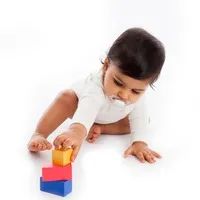
As parents, we want what’s best for our children. We want to provide everything our children need, when they need it in order for them grow into bright, confident, and joyful adults. However, unless you have an understanding of your child’s cycles and stages of development, you are leaving her future up to chance.
Firstly, it is important to understand that--developmentally speaking--the first six years of life are the most critical. Children develop 85% of their core brain structure by the time they are five years old. The child will build on this core foundation throughout the rest of his life. Study after study has proven beyond a doubt, that the quality of the learning environment during these formative years has a direct and predictable effect on thinking, reasoning, language, physical ability, and social and emotional behavior. What do you mean by “predictable,” you might ask. In answer, I offer this example. According to the Governors’ 2014 State of the State Addresses, “…children who do not participate in high-quality early education are:
- 25% more likely to drop out of school,
- 40% more likely to become a teen parent,
- 50% more likely to be placed in special education,
- 60% more likely to never attend college,
- And 70% more likely to be arrested for a violent crime.”
Does that scare you at all? Yeah, me too! That said, I don’t mention these statistics for the sake of instilling fear. Instead, I mean to offer information. Age of Montessori wants to educate parents (and grandparents, and childcare providers) about the positive changes that can come if they understand early childhood basics – how the brain works and how children develops.
How Children Really Learn
After a lifetime of observation and study, Maria Montessori understood the child’s cycles of development, and parents can benefit from Montessori’s profound discoveries. Montessori’s methodologies aren’t just for the classroom; they are about understanding how children really think, learn, and progress.
I observed little children; I sensed their needs; I tried to fulfill them; they call that the Montessori Method. - Maria Montessori
Maria Montessori discovered that the young child’s mind is like an absorbent sponge. In other words, they learn effortlessly and indiscriminately. Children this age are taking in everything around them, good and bad. They also experience powerful “sensitive periods” during which they seek and grasp very specific information more easily and naturally than at any other time. To tap into these sensitive periods is to maximize the natural desire to learn in young children. Montessori refers to this as “spontaneous learning.”
And so we discovered that education is not something which the teacher does, but that it is a natural process which develops spontaneously in the human being. It is not acquired by listening to words, but in virtue of experiences in which the child acts on his environment. The teacher’s task is not to talk, but to prepare and arrange a series of motives for cultural activity in a special environment made for the child. - Maria Montessori
When you understand your child’s cycles of development, and offer the right activities at the right time, you will be amazed by your child’s spontaneous interest. She may settle down for extended periods of time to concentrate fully (and happily) on a single task. Or he may repeat the same task over and over again, until he satisfies his need for understanding.
…if we compare our ability as adults to that of the child, it would require us 60 years of hard work to achieve what a child has achieved in these first three years. - Maria Montessori
For a thorough understanding of these concepts, check out Age of Montessori’s Child Development Course, an in-depth study of the stages of development (featuring a wonderful chart Maria Montessori drew in her 1941 course in India, faithfully copied by Dr. Elisabeth Caspari, friend and student of Montessori) and the sensitive periods as they relate to current brain research.
Child Development Course (online)

The first three years of life are the most important for the development of trust, self-esteem, intelligence and so much more. It is the period Montessori called “The Absorbent Mind” because the child learns without being taught. He takes in everything in his environment without effort and without discrimination in a process that allows for a great explosion of learning.
“…if we compare our ability as adults to that of the child, it would require us 60 years of hard work to achieve what a child has achieved in these first three years.”
from The Absorbent Mind, p.6.by Maria Montessori





















